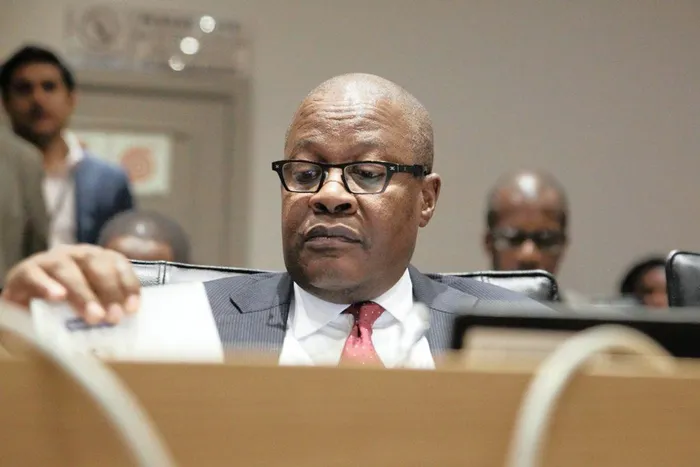Ombud rules in favour of Molefe

The Sunday Times has to retract its report that says former Eskom chief executive Brian Molefe "claimed" that he had been visiting a shebeen in Saxonwold. Picture: Mlandeli Puzi The Sunday Times has to retract its report that says former Eskom chief executive Brian Molefe "claimed" that he had been visiting a shebeen in Saxonwold. Picture: Mlandeli Puzi
Former Eskom chief executive Brian Molefe is mulling his next step after a significant ruling in his favour by the press ombud, Johan Retief.
Molefe had complained to the Press Council after the Sunday Times had carried a front-page article on January 29, 2017 headlined “From Saxonwold shebeen to MP - shamed by public protector, Molefe is set for comeback”.
Molefe was sworn in as an ANC MP after resigning from Eskom following former public protector Thuli Madonsela’s State of Capture report, which placed him in the area of the residence of the notorious Gupta family 19 times.
The Sunday Times reported that he had denied this and had instead “claimed” to have visited a shebeen in nearby Saxonwold.
This was inaccurate reporting, Retief said, and a breach of Section 1.1 of the SA Code of Ethics and Conduct, which states: “The media shall take care to report news truthfully, accurately and fairly.”
He ruled that it was a tier 2 (a serious) breach.
Responding after the ruling, Molefe said: “I’m happy about the outcome. I did not say I was at a shebeen - and I hope this will put the matter to rest. This story was run repeatedly in all the media - from print to radio, and from Facebook to Twitter.”
He said he had been ridiculed and that his reputation had been seriously damaged.
“I am going to take legal advice,” he said. “We have
a very robust media, and we have freedom of speech, which is very good for the country. But sometimes they make unfortunate mistakes - and this can spark a kangaroo court mentality. It can ruin careers,” Molefe said.
He added it was ironic that just before he had been castigated, the public protector had made a ruling in favour of a family, referred to as the Khumalos, who had had their electricity cut off for tampering with their meter.
“She ruled that the family had not been given a proper opportunity to state their case - and I agreed with the ruling,” he said.
“But people make selective judgments. Everyone came to the conclusion that because I was in the vicinity of Saxonwold, I am corrupt.
“I also pointed out that I drive home on the N1, and that near the Olifantsfontein off-ramp, there is a Teasers strip club with, probably, a cellphone mast nearby. Based on this, could people then claim that I go to Teasers twice a day? The same with Saxonwold: if I drive past it and this is picked up by a cellphone mast, does this mean I’m corrupt?”
Molefe said the public protector had not asked him about his cellphone calls.
“The Public Protector Act says that when the public protector obtains information that may be detrimental to a person being investigated, she is obliged to let that person know. She is also obliged to allow the person being investigated to question the people giving information about him or her.” He said the public protector had not offered him this opportunity.
“The right to be heard is a constitutional right. The public protector may well have trampled on my right to be heard. She wrote a report, which she felt only she was capable of doing – and deemed this to be final.”